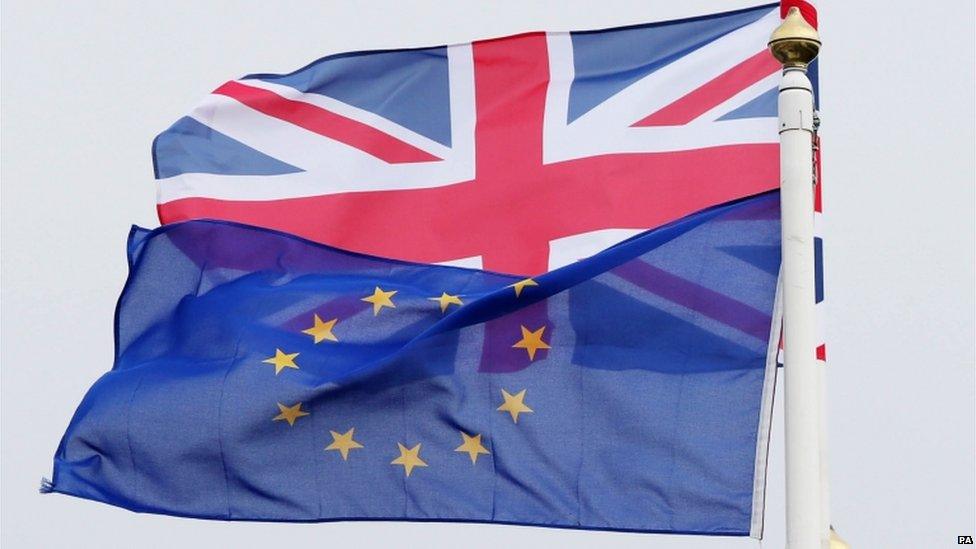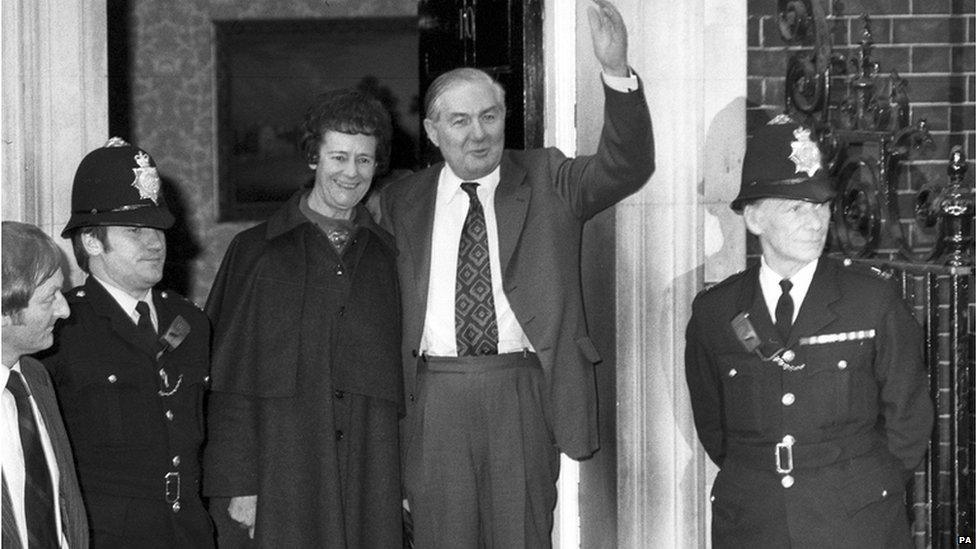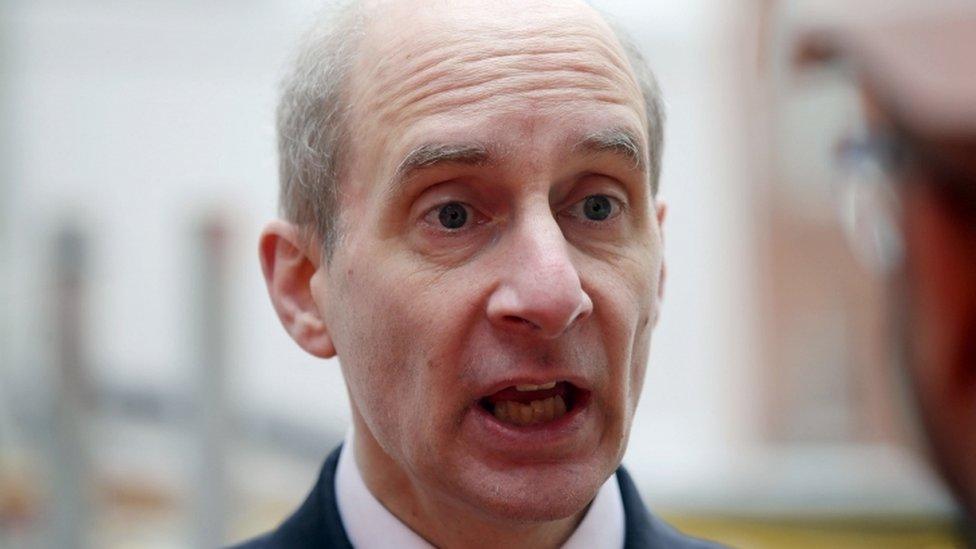Week ahead in Parliament
- Published
- comments

It's the last two days before the summer recess - and the agenda looks pretty light as the parliamentarians coast towards their holiday break, so light, indeed, that the government attempted to cancel this week's sitting altogether.
But as readers of this blog will know, the agenda available the week before may not flag up unexpected dramas, and after the turmoil of the last couple of weeks, it is far from impossible that there may be a grand operatic finale to a turbulent couple of months.
One point of interest will be whether the government Chief Whip, Julian Smith, is forced to the dispatch box to make an unprecedented statement about the "pairing" row, which has rumbled on since last week's close votes on the customs and trade bills.
This may seem a very internal issue, but it's worth remembering that the system of allowing pairing, where one side's MPs don't take part in a vote so that MPs on the other side, with medical issues, don't have to, is a sacrosanct part of Commons life.
And - because on less vital votes, it is extended to allow MPs to get away for other reasons - it is one which is vital to MPs quality of life, leaving aside the toxic allegation of cheating. Which is a long winded way of saying there will be hell to pay if it breaks down, because the Opposition decides it can't trust the government to honour those arrangements.

James Callaghan's government lost its majority - and the pairing arrangement in the Commons broke down
Such a breakdown has happened before. In the mid-1970s, when the Labour government of James Callaghan lost its majority, the Conservatives believed that the government whips had broken a pairing arrangement, and cancelled all pairing. The result was the sick and the dying were bussed into the Commons for big votes, with life-shortening consequences. So this is a row the government will be keen to defuse.
Apart from that possibility, it looks as if the most interesting action will come in Tuesday's clutch of select committee hearings - where a number of Cabinet ministers are due to give evidence.
And watch out for quite a few select committee reports - many inquiries have reached the end of their life-cycle, and swarms of new reports have been emerging. There are plenty more to come.
Here's my rundown of a truncated week ahead:
Monday 23 July
The Commons opens (2.30pm) with Housing, Communities and Local Government questions, after which any post-weekend urgent questions or ministerial statements will follow.
The day's main business is a general debate on strengthening the union, which will doubtless provide lively exchanges between the SNP and everyone else - and perhaps another of the SNP's cleverly-engineered YouTube moments.
And the day will end with an adjournment debate on the societal effect of the drug mamba - a synthetic form of cannabis, formerly sold as a 'legal high' and now illegal.
On the committee corridor, the Housing, Communities and Local Government Committee has a hearing on Brexit and local government (4.15pm) which looks at which powers currently held by the EU could be transferred to town halls after the UK's exit.
In the Lords (2.30pm) the subjects for questions to ministers include preventing the use of performance-enhancing drugs in junior and amateur sport, and enabling citizens to enter into a same-sex marriage in British Overseas Territories.
And the main debate is on preparations and negotiations connected to the UK's exit from the EU - there are 56 peers listed to speak. But it's a general debate in which the expectation is that the usual suspects will make their usual speeches.
Tuesday 24 July
It's the last day of term in the Commons (from 11.30am), when the Whips, by tradition, allow MPs to bring in board games.
Proceedings open with Health and Social Care questions, providing a dispatch box debut, in his new role for the new Health Secretary, Matthew Hancock - and it will be interesting to see if he makes a break from his predecessor, Jeremy Hunt's, consensual style.
A long-time ally of George Osborne, Mr Hancock has a rather similar style, combining hard political strategy with controlled aggression; there are some who wonder if that will work with the NHS.
The Conservative Helen Whately has a Ten Minute Rule Bill on Civil Aviation (Accessibility) - which focuses on the needs of people with disabilities - creating new requirements on parking at airports and other accessibility issues and requiring a named person to be responsible for air passengers with disabilities.
Then comes a motion to accept the recommendations of the Committee on Standards report on the DUP MP Ian Paisley, external which would suspend him from the service of the House for 30 sitting days, beginning Tuesday 4 September.
Mr Paisley apologised to MPs and his constituents for breaching parliamentary rules on paid advocacy, by writing a letter asking the prime minister about a proposed UN resolution concerning Sri Lanka, having received holidays and hospitality from that government.
So delicately balanced is the current House of Commons, that even the suspension of one MP could tilt some critical Commons vote in the weeks after the summer recess.
Having dealt with that matter, MPs move on to their traditional, and rather amorphous pre-Recess debate, where any MP can speak about any subject.
In Westminster Hall debates begin with the Conservative Luke Graham on the remit of the Office of Budget Responsibility, external (9.30am).
He wants to give the OBR, which vets government economic figures and projections, a wider role in examining the full range of legislation and costing it, including the proposals of Opposition parties. That could be interesting from any number of points of view, but it is a role performed by the Congressional Budget Office in the United States, which scores every piece of legislation before the American Congress from both government and opposition.
Other debates include: taxpayer liability for safety at the Wylfa Nuclear power project (2.30pm): rail investment in the East Midlands (4pm) and family hubs (4.30pm).
It's a surprisingly busy day on the committee corridor, with two new secretaries of state appearing before their select committees - Matt Hancock before Health (2.30pm), and Dominic Raab before the Brexit Committee (2pm). Mr Raab is accompanied by Oliver "Olly" Robbins, the prime minister's Europe advisor, a figure high in Brexiteer demonology.
The session will focus on recent developments following the publication of the government's White Paper on the future relationship, issues that remain outstanding relating to the withdrawal agreement, and the government's priorities as the October European Council summit approaches.

Will Lord Adonis win his push to cut short peers' summer holidays?
Public Administration and Constitutional Affairs quiz the political savants of the Independent Commission on Referendums, who have been looking at how future referendums should be conducted (10.30am); and the Transport Secretary, Chris Grayling, is before the Transport Committee (2pm) on the subject of the Intercity East Coast rail franchise - their inquiry examines the lessons from previous franchise failures, and the wider implications for the rail franchising system.
In the Lords (11am), questions to ministers cover the cost estimate and business case for HS2 Phase One, the implications for the government's domestic abuse strategy of the default payment of universal credit to couples, and the precedents for Parliament providing the government with a mandate for international negotiations.
After that, peers rattle through a series of legislative mini-bites: first, the second reading of the Non-Domestic Rating (Nursery Grounds) Bill, external - a "tiddler bill" where the key issue is around restoring the exemption from non-domestic rates for agricultural premises which are nursery grounds and which operate under covered premises.
There will also be brief third reading rubber stampings of four private members' bills: the Registration of Marriage Bill, external, which allows the names of mothers to be recorded on marriage certificates; the Assaults on Emergency Workers (Offences) Bill, external, which makes such assaults an aggravated offence; the Parental Bereavement (Leave and Pay) Bill, external, and the Home Education (Duty of Local Authorities) Bill, external, which aims to tighten up the monitoring of the welfare of children being homeschooled.
These are followed by three statutory instrument approval motions: the first on immigration data; followed by two on Higher Education financial support and fees. Final business of the day is a regret motion from Labour's Lord Watson, on information sharing under the 2017 Higher Education and Research Act which criticises the government for selling confidential student data.
The final event before the summer (and despite its aim, I would be amazed if it wasn't the final event) is the motion from the Labour peer and arch-Remainer, Lord Adonis, to stop peers rising for their summer recess. He argues that there will be considerable action around the Brexit negotiations and that peers should remain on their red benches to keep tabs on them. He also suggests that voters will wonder where their Parliament is whilst such important events are unfolding. But I doubt even he expects to convince a majority to abandon their summer holiday.
And unless he does, or unless Parliament is recalled, MPs and peers will then depart - returning on Tuesday 4 September.
I will post the usual preview towards the end of August.
Happy holidays.